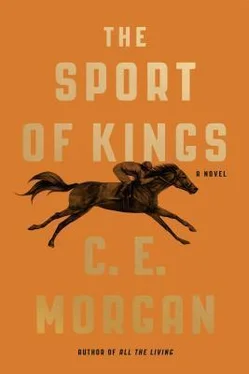“What?” she said warily.
“You think this is pain?” he said. “Shit. Let me tell you, when I was in two months, I saw a man get killed right beside me. Like far away as you are. We was — were walking down the hall to the yard and some dudes were coming back and this brother in front of me reached out with a shank and just sliced this other dude’s belly open. Like left to right and up. Opened up his belly and his guts came out.”
“Jesus,” said Henrietta in a whisper.
Allmon didn’t even notice. “Your guts ain’t red like you think they’ll be. They’re gray. And not big.”
Then two things happened at once: he realized Henrietta was staring at him with a gaze as bright as a shadeless bulb, and he remembered his vow to never breathe a word of his life inside. He clamped his eyes shut and she said, much to his surprise, “Your life has been hard.”
Set against the backdrop of his existence, it was absurd undertalk and should have made him angry, but it didn’t. It was just simple, true. When she reached forward and lifted the polo away from the cut to check the bleeding, he didn’t open his eyes, but he didn’t resist. She said, “Do you know who Darwin was?”
Now he opened his eyes and looked at her sharply from the side.
“Right, sorry.” She cleared her throat. “Well, there’s this story about Darwin that’s always stuck in my mind. You know, he came up with the theory of evolution in part because of finches he studied from the Galápagos Islands. But when he first got to Chatham Island, it was really more a disappointment than anything. It looked to him like … a furnace, like a geological furnace. It looked stripped of life; there was ash on the air and it was inhabited mostly by lizards. But it was in a place that first struck him as a hell on earth that he found the key to the best idea anyone ever though up. He found the key to life.”
Allmon was listening carefully, but Henrietta suddenly shrugged and looked away, as if she too had divulged something a little too personal and now felt rather foolish.
“It looks like you’ve stopped bleeding,” she said suddenly. “You can get a clean shirt in the office. If you need to take an early day, that’s fine.” Then she rose and was moving abruptly away into the sweet, Southern glamour of the property — barns like summer blacktop, coins glittering in the streams, and, of course, the house: solitary, steeped in morning light, proud, and perfect. A thing built to last. How he burned to go inside.
“Hey!” Allmon called out, sitting up straighter, the sudden movement striking his nose and forehead like a fresh blow.
Henrietta turned and lowered her head. “What?”
“You should come back and talk to me sometime. You got interesting things to say. I appreciate that.” And he smiled the first smile she’d ever seen on his face, however unsettling.
* * *
He made a point to watch her from across the fields, from the far end of the barn, from the next stall. And when she turned to look, he didn’t turn away.
* * *
Lou had come again with her quiet hands and reassuring voice, checking the articulate muscles of the foal’s neck, palpating her velvet jaw, walking watchful circles, probing the recesses of her mouth back to the slick muscles of the jaw. But there was nothing to be found except the undeniable fact of excellence; the foal was exceptionally fine. The mouth problem was not a problem at all, just a tic.
And yet Henry was uneasy. He called Henrietta down after Lou left, fretting and insisting that she see it herself.
He said, “Her dentition is perfect, her bite is good. But look.”
Henrietta watched as the foal, now almost ninety days old, turned aside, fixing them squarely in the big globe of her brown eye, then tossed her head with her mouth working. Her lips curled out and back twice, then fluttered loosely, almost comically on the breath.
“Good God,” she said, “is she grinding her teeth? Is she in pain? These inbred horses—”
“No, no. Lou said she’s just working her lips and jaw.”
“So she’s just mouthy.”
“I don’t like it,” Henry said, folding his arms across his chest. “And I don’t like that she still doesn’t have a name.”
A small smile grew on Henrietta’s face. “Why, Henry Forge, maybe she’s trying to talk to you.”
“She needs a good name. She’s going to be a beast.”
“I wonder what she’s saying…”
“Bold Ruler was tough and Nasrullah was wild, so—”
“Oh!” Henrietta said, laughing.
She’s out of Hellcat by Secretariat
Out of Seconds Flat by Second Chance
She speaks just like Xanthus, Achilles’ charger
This is Hellsmouth, Father
“Let’s name her Hellsmouth.”
* * *
Henrietta didn’t wait very long; it was nature. It was the epithelium, dark with melanin, stretched taut over the soft architecture of muscles, striated and smooth, the fine wiring of the nervous system firing north and south, east and west; it was all that living bone, full of mineral and marrow and run through with red coal seams; bones stacked neatly to craft his six feet; the golden eye under the ledge of his brow under the strong vault of his cranium, its twenty-two bones so neatly placed they seemed arranged by hand; it was the curvy stack of the spinal column, the aborted wings of the scapula, the sharp clavicles and the belling ribs; the long fall of the arms; the hands and the feet, each a bony masterpiece of locomotion wrapped for travel in four muscular layers; the long pinnate muscles along the tibia, the strong bunching along the thigh; it was the basin of the pelvis, false and true, and the organs of generation, conducted by muscles and ligaments and fibers, the hanging scrotum, the vesicles, the prostate and Cowper’s glands; and the sheathed root of the penis, the defiant, erectile body, the tender extremity with its timeless tunnel back to the seminal testes with their millions upon millions waiting in the dark.
She found him seated on an old mustard bench in the tack room, the bare bulb above him directing bright light onto his body but carving drastic, obscuring shadows onto his face. Tack was spread in all directions on old saddle blankets. A gallon of thick conditioner lay open and Allmon reached his hands into it, scooped out the white grease, and then worked it into the old bridles and saddles, their hides thirsty from neglect.
She saw him start when she upended an empty meal bucket to sit opposite him as he worked over the noseband of a bridle. He glanced at her askance and saw her scorched earth eyes. She seemed to burn at a higher temperature than everyone else. It made sweat prickle on his neck.
“You done working?” He’d saved up interesting things to tell her, but he couldn’t find any of them now. His confidence seesawed.
“Yes,” she said. He nodded slowly, intent on his project, but her gaze was just steady, unrelenting, and she saw it clear as day when his breathing grew uneven.
“Tell me something,” she said.
He waited, the muscles of his shoulders bunched so tight his hands felt numb. Some premonition pinched the nerves along his broad back. He’d been looking for an in; was this it?
“You’ve spent some time with my father by now. What do you think he wants the most?”
It wasn’t what he was expecting. He looked up quizzically as if she’d just offered up a riddle.
“Tell me as someone who’s only just met him. Does he want a legacy, a family, a … what?”
Allmon actually stopped what he was doing and considered what she was asking. His voice was very quiet when he said, “A legacy. He wants folks to remember he was like a great man.”
Henrietta sighed. “Why do men care about that so much — to the extent where they’re willing to breed horses to their own siblings, their own mother?”
Читать дальше
Конец ознакомительного отрывка
Купить книгу












